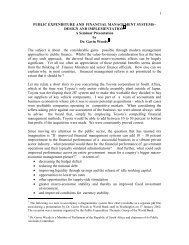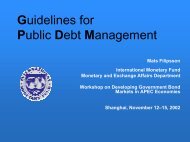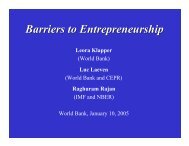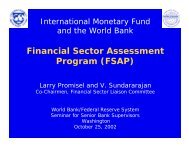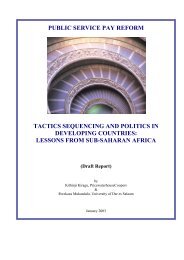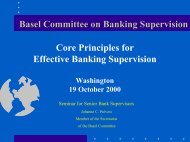CORRUPTION ASSESSMENT: MOZAMBIQUE - World Bank
CORRUPTION ASSESSMENT: MOZAMBIQUE - World Bank
CORRUPTION ASSESSMENT: MOZAMBIQUE - World Bank
Create successful ePaper yourself
Turn your PDF publications into a flip-book with our unique Google optimized e-Paper software.
PARPA and other medium term planning instruments, which should provide the strategicframework for the annual budget; (vii) absence of follow-up on audits (in 2004, 15financial and two contract audits, and 100 account verification reports) submitted to theAdministrative Tribunal; and (viii) the lack of parliamentary capacity to analyze thebudget and preferential provision of information by the executive to Frelimorepresentatives.Despite the more positive environment for civil society since the end of the formal onepartysystem, including the establishment of various frameworks for a formal exchangeof views between civil society organizations and the government, budget issues have notbecome a focus of interest for civil society organizations. Media coverage of budgetissues has also been weak and there is no evidence that government budget policy isinfluenced by the media.Interests and capacities of key actorsThe key actors, their incentives and their contributions to the budget process can bedescribed as follows:The executive. The main interest of the politicians involved in overseeing the process isto ensure the continued functioning of the state apparatus and the payment of salaries tothe countries’ civil servants. They also want to avoid disruption to public servicesbecause it could create an impression of administrative incompetence that would bedamaging to the government’s public image. In so far as a growing internal resource basesupplemented by donor support makes it possible to expand services, this also serves thepoliticians’ interest, as they need to be seen to be responding to the population’s concernsand needs. Increasing access to resources also allows for their distribution in politicallybeneficial ways, either through provision of legitimate services in politically importantregions, or through illegitimate means such as preferential contracting and hiringpractices. Overall, there is little motivation at the highest political levels to thinkstrategically about resource allocation or to introduce structural changes in thecomposition of expenditures.More generally, low salary levels and the informal tolerance of income-diversificationactivities among government staff have resulted in large numbers of civil servants,particularly those with the best qualifications, engaging in consultancy and otherremunerative activities alongside their official jobs, with obvious costs for productivityand conflicts of interest.Political parties. There is not really a Frelimo budget policy distinct from that of thestate. The content of the budget comes from the executive, rather than the party.However, the approach to some key budget issues reflects the ruling party’s generalideological stand: for example, the taboo on discussing issues of territorial equity inresource allocation and service delivery reflects Frelimo’s stance on national unity, whichleaves limited place for acknowledging regional interests.FINAL REPORT 29


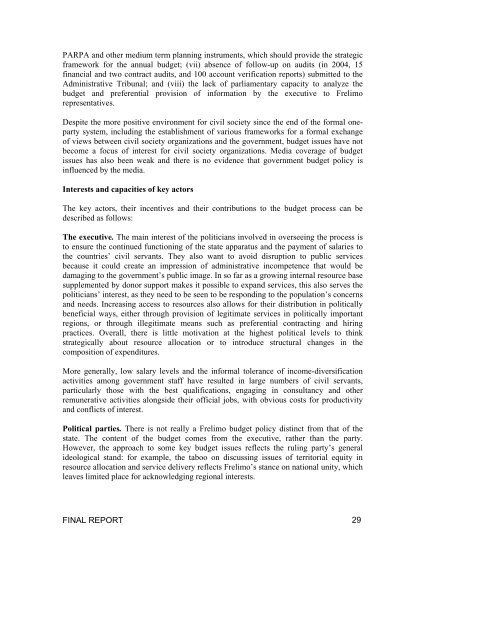
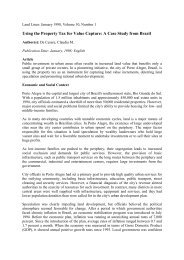

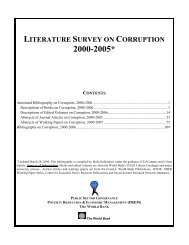
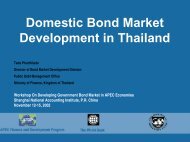
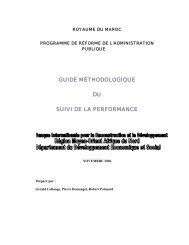
![Budget Execution: Overview [PDF 453K]; Bill Dorotinsky - World Bank](https://img.yumpu.com/47844909/1/190x143/budget-execution-overview-pdf-453k-bill-dorotinsky-world-bank.jpg?quality=85)
